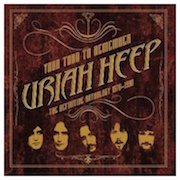Long-running London outfit Uriah Heep are sometimes lumped into a foursome with fellow British hard rock pioneers Black Sabbath, Deep Purple, and Led Zeppelin. But, besides their kinship in era, genre, and country of origin, Uriah Heep don’t quite measure up. In their five-decade career, they’ve sold only about half as many records as their closest competitor, Black Sabbath, and ten percent as many as Led Zeppelin. And while their name is likely familiar to today’s classic rock fanatics, Uriah Heep pale in comparison to the three other bands in terms of popularity, influence, and critical regard today. At this point, they only retain a cult appeal—especially fervent in Eastern Europe and Japan—that receives a boost from the multi-platinum 1972 magnum opus Demons and Wizards, a vital document of the epoch that ranks alongside Sabbath Bloody Sabbath and Blue Öyster Cult’s first few albums.
Considering the strength of Demons and Wizards, are the oft-maligned Uriah Heep due for reconsideration? Does Your Turn to Remember: The Definitive Anthology 1970–1990, a 32-song compilation that kicks off a massive reissue campaign of LPs from Uriah Heep’s ‘definitive’ period, try to posit the band as a group among equals in the aforementioned foursome? If so, it sets itself up for failure: even at their best, Uriah Heep simply have never been as good or important as Black Sabbath, Deep Purple, or Led Zeppelin. But what Your Turn to Remember lacks in evidence of qualitative equivalence, it makes up for with a sprawlingly heterogeneous mix of lucid rock songs. Like Led Zeppelin in particular, Uriah Heep have always been sure-footed on any number of diverse stylistic terrains, from post-Fairport Convention folk to proto-Judas Priest heavy metal. Ultimately, Your Turn to Remember—unhinged in its variety, yet consistent in its clever melodic sensibility—captures a band lunging after every glimmer of an idea and, against all odds, often hitting their marks.
The compilation’s first four tracks set the scene nicely: each one—‘Gypsy’, ‘Come Away Melinda’, ‘Bird of Prey’, and ‘Lady in Black’, all from Uriah Heep’s early years—confidently inhabits its own musical universe while having very little to do aesthetically with the tracks surrounding it. ‘Gypsy’ rocks with the organ-driven, cosmic energy of mid-’70s Hawkwind, with the band’s original singer David Byron (1969-1976) dramatically setting a vocal paradigm for Rob Halford to follow. ‘Come Away Melinda’ is a saccharine folk-rock track with echoes of Love and Scott Walker; ‘Bird of Prey’ betrays a hitherto-hidden interest in the blues, a la Dr. Feelgood; and ‘Lady in Black’, one of the band’s biggest hits, is a foot-stomping barroom singalong.
In the compilation’s press release, keyboardist Ken Hensley says that, when he first played ‘Lady in Black’ for his bandmates, everyone found it a bit ‘out of character’. As a band with only one constant member—the still-active Mick Box—‘out of character’ appears to be Uriah Heep’s guiding principle. If you listen closely, as Your Turn to Remember moves into its second disc, the smooth Eagles-esque rock of ‘Free Me’, ‘Rockarama’s industrial take on Robert Palmer, and the by-the-numbers hair metal in ‘Straight Through the Heart’ begin to—despite their apparent disjunction—project something of a unified voice. Which is to say, the compilation is unfocused, but that actually makes it a more engaging listen. In the internet age, everything gets reshuffled constantly; we’re always offered a new look, a new lens, a new idea. We can rewrite rock’s histories subjectively for better or for worse, by listening only for the good parts, of which Your Turn to Remember has many, and skipping through the rest. The compilation’s title has an unintentional invitation: Uriah Heep are remembered as cheesy, but, with this scattered collection of their songs, you can refashion your conceptions—or memories—however you choose.


